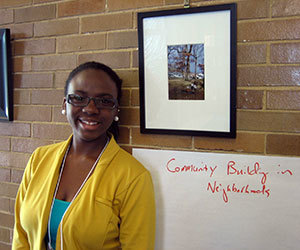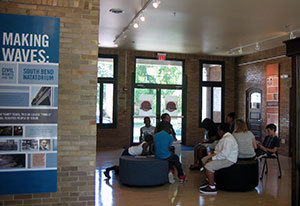 RCLC Photoformer Anastasia Smith-Davis photographed a scene where a homeless person had spent the night
RCLC Photoformer Anastasia Smith-Davis photographed a scene where a homeless person had spent the night
Over the past three years, the University of Notre Dame’s Center for Social Concerns, Robinson Community Learning Center and the Neighborhood Resources Corp. have teamed together to support the Engaging Youth, Engaging Neighborhoods (EYEN) project, a neighborhood development initiative whose goal is to involve kids in community change.
About three years ago, the Neighborhood Resources Corp., or NRC, board wanted to create a youth program that would give kids a voice on how to improve their neighborhoods. Naomi Penney, who recently ended her second term as board president and is a former research associate for the Center for Social Concerns, said the original project idea was based on using a research method called Photovoice. The vision was for groups to work from a theme, such as “Living in my neighborhood,” “Twelve great things about my neighborhood” or “Twelve things I’d like to change about my neighborhood.”
Penney reached out to the Center for Social Concerns, or CSC, which works to facilitate partnerships between organizations and the University. The connection with NRC is one example of how this is possible, Penney said. The NRC planned to draw from 36 neighborhoods identified in the community, said Diana Hess, NRC’s executive director.
The first year, 2011-2012, one team of youths in grades 7-12 from the Monroe Park Neighborhood Association participated. Working with the NRC, neighborhood leaders, community volunteers, city administration and the CSC, the students walked their neighborhood to explore what’s going on. They met in small discussion groups to talk with other students about their neighborhoods and finally proposed a plan to solve one of the things they saw as needing to be changed. What they identified as a key concern was that they had nowhere to play. They were worried about trash and safety. Their realistic, reasonable request was to repair one stretch of sidewalk, Penney said.
Once the project was complete, Maria McKenna, assistant professional specialist for Notre Dame’s Institute for Educational Initiatives; Kevin Burke, assistant professional specialist for Notre Dame’s Alliance for Catholic Education; and Stuart Greene, associate professor of English with a joint appointment in Africana Studies — Center for Social Concerns faculty members who acted as facilitators, coordinators and researchers for the initial project — wrote up the experience and submitted it to a national outreach conference. The girls were invited to be co-presenters with the faculty.
 EYEN project breakout sessions addressed safety and access to affordable housing
EYEN project breakout sessions addressed safety and access to affordable housing
For the second year, 2012-13, Jacquee Dickey from the Robinson Community Learning Center contacted the NRC, expressing a desire for her RCLC Photoformers photography students to be involved in the project. The Robinson Center is located in the Northeast Neighborhood and has connections to that neighborhood association and the larger community.
This group decided it wanted to improve Kelly Park in the Near Northeast Neighborhood. They presented findings and suggestions to South Bend Mayor Pete Buttigieg and met with an area landscaper to look at how they could reclaim their park, Penney said.
Greene said the students thought a lot about ways to create spaces and used a very democratic process in approaching the park idea. “Kids immediately think about everyone around them, young and old — not just themselves,” he said.
Key points of EYEN are creating a sense of community, creating a sense of voice and creating a sense of democratic space, Greene said. The project work is designed to explore how the process used in EYEN makes changes in neighborhoods, as well as evaluates how the experience changes the way students think about getting involved in local projects.
From the experience, kids have realized what they say matters. Anyjah Perkins, who was in ninth grade at the time she participated, said the entire experience changed her view on dealing with opposition and made her realize she does have a voice.
“Before, (adults) didn’t pay attention to what we said,” she said.
So far, there have been two rounds of completed projects; a third round will begin in January. For the 2013-14 academic year, the NRC is considering working with community centers such as La Casa de Amistad Inc., the Charles Martin Youth Center, the Ray and Joan Kroc Corps Community Center, the Notre Dame Center for Arts and Culture and others.
“These projects build the fabric of the neighborhoods,” Penney said.
The Center for Social Concerns provides community-based learning courses, community-based research and service opportunities for students and faculty at the University of Notre Dame. Over the past 29 years, the CSC has offered educational experiences in social concerns inspired by Gospel values and the Catholic social tradition.
Founded in 2001 as a community-driven education center sponsored by Notre Dame in partnership with school, religious and civic leaders, the Robinson Community Learning Center offers innovative tutoring, violence prevention, youth entrepreneurship and performing arts projects for adults and children in South Bend’s Northeast Neighborhood.
The Neighborhood Resources Corp. Inc. is a nonprofit organization that works exclusively for South Bend neighborhoods and neighborhood organizations. NRC programs offer technical assistance, training scholarships and three grant initiatives designed to engage, educate, empower and energize neighbors to reinvent their neighborhoods.
Read the complete story on the CSC website.